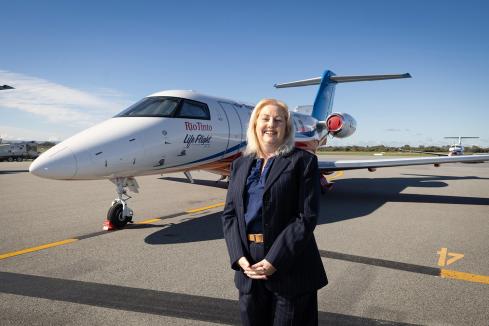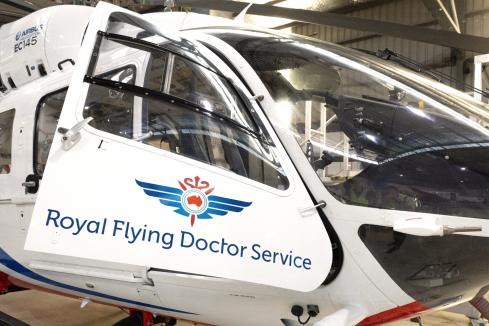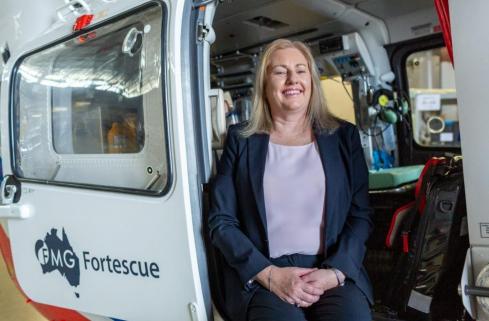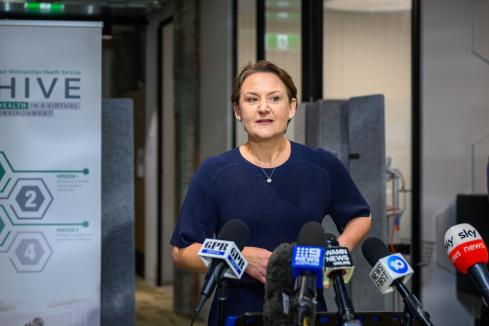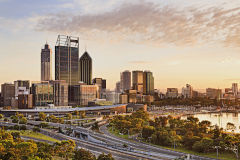
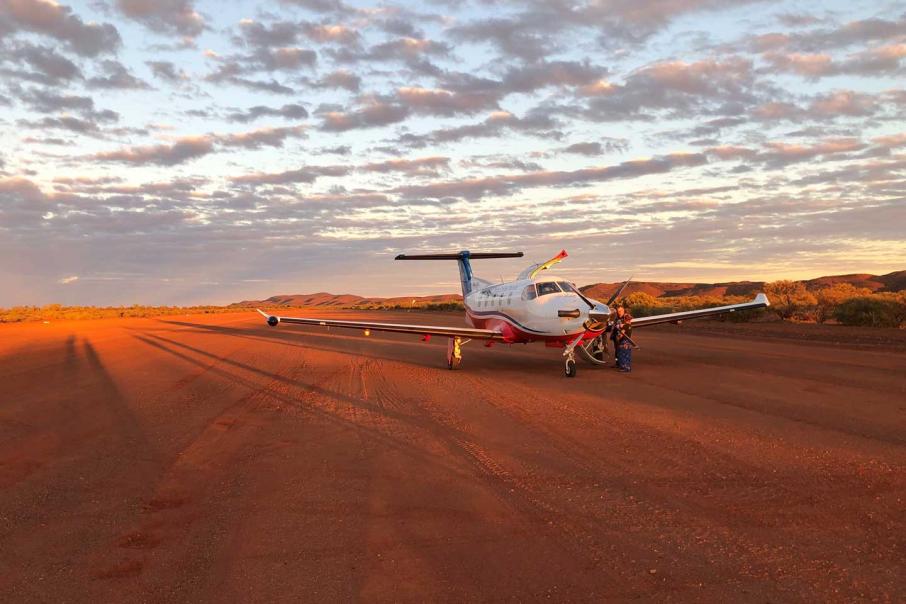
For the past 90 years, the Royal Flying Doctor Service in WA has saved lives with fast, free and efficient emergency retrievals, and brought the hospital emergency room, dentist’s chair and pharmacy to all Western Australians from Denmark to Cape Leveque.
Over those years, the organisation has evolved and adapted, recognising opportunities for growth as they arise and investing in an ever-growing fleet. As well as the fleet expansion, the investment in the RFDS team – and recognition of special skills to augment the offering of this critical service – has resulted in some extraordinary career progressions.
Damien Whitham began his career with RFDS as its youngest ever pilot at the time, working tirelessly for five years with flight nurses and doctors to provide patient care to those in need 24/7. He has since risen through the ranks to become a key member of the executive team as General Manager, Operations.

RFDS WA GM Operations Damien Whitham
Responsible for the complex logistics of RFDS’s lifesaving services, including an average of 27 patient retrievals a day, and healthcare services across 2.5 million square kilometres in WA, Damien has been instrumental in responding to record demand over the past two years. Driven by the extraordinary demands created by COVID-19 for the service in remote locations, and the roll-out of the Federal Government’s vaccination program which has so far administered over 10,000 vaccines in WA’s most vulnerable and remote communities, Damien’s work is far from over.
Despite COVID-19 grabbing the headlines, the day-to-day work of RFDS continues unabated.
“It’s essential that we’re ready to fly at a moment’s notice, and that takes extensive preparation from a highly skilled team of engineers, flight nurses, doctors, pilots, logisticians and support staff,” said Damien.
“Our network of five bases, located across WA in Broome, Port Hedland, Meekatharra, Kalgoorlie and Jandakot allows the RFDS to respond to medical emergencies, 24-hours a day, 365 days a year.”
Providing such a reliable service is only made possible by keeping a constant check on the aeromedical fleet’s fitness to fly – and adding new aircraft when necessary to bolster the ability of the medical staff to respond to need, as and when required, anywhere in WA.
In March 2022, the fleet was boosted by the arrival of a new state-of-the-art jet made possible by a $15 million investment from Rio Tinto as part of a six-year partnership extension. The RFDS in WA currently operates an integrated and diverse aircraft fleet of 17 PC-12 turboprop aircraft, three Rio Tinto LifeFlight PC-24 jet aircraft and two Fortescue Heli-Med Service EC-145 helicopters.
“Our fleet continues to revolutionise the way we can coordinate our crew and services across Western Australia,” said Damien.
“Each RFDS aircraft is equipped with state-of-the-art aeromedical equipment and staffed with highly skilled pilots, doctors and flight nurses. Each aircraft is literally an Intensive Care Unit in the sky.”
Damien knows what he’s talking about when it comes to aircraft. Early in his career, he was offered jobs at Qantas and RFDS on the same day, and while the RFDS job meant less pay and living remotely in the Kimberley, it also aligned with his passion to give back to the community and make a real difference to people’s lives. He chose the RFDS and has never looked back. With 18 years’ experience as a pilot under his belt, Damien flew both the PC-12 and PC-24 aircraft and became a senior member of the aviation training and checking team.
Fast forward to 2022, and Damien is leading four major projects that are changing the course of patient care in regional WA, including integrating aeromedical helicopters into the RFDS fleet – a first for the RFDS nationally – to provide more flexibility to respond to patient needs.
“We’re also growing and diversifying the RFDS’ commercial partnerships to provide clinical and aeromedical services to industries including offshore oil and gas, and boosting the charity’s financial sustainability,” he said.

RFDS WA PHC nurse Kate Jones, Minister Roger Cook and GM Operations Damien Whitham in Bidydanga on a remote COVID19 vax clinic
An important additional project is to adapt the RFDS service to ensure patient and staff safety from COVID-19, establishing a remote community vaccination program while continuing to grow RFDS’s response capability.
Continually striving for improvement and innovation isn’t just an admiral aim; it’s a very necessary strategy as the need for the service shows no sign of slowing down.
“In 2021, crews flew nine million kilometres to reach more than 10,000 patients across the State, breaking all records from previous years,” said Damien.
Undoubtedly the spread of COVID-19 has called on the RFDS team to rise to challenges in ways the founder of the service could never have anticipated, 90 years ago. The vision the Rev John Flynn had to provide a ‘mantle of safety for the people of the bush still runs like a golden thread through the organisation but even he could not have predicted that in 2020, the service he created would be called upon to evacuate Australia’s first COVID-19 case from a cruise ship in Darwin. Damien was an instrumental part of the team which effected this transfer, ensuring the crew was willing, informed and protected.
“To date, the RFDS in WA has retrieved 167 suspected or confirmed COVID-19-positive patients without incident,” said Damien.
This has been possible thanks to the exceptional efficiency of the RFDS Operations Centre which works alongside the State Health Incident Coordination Centre.
“The 24/7 Coordination Centre at the RFDS Jandakot base is open every hour of every day in the year. We receive around 50,000 calls for medical assistance each year,” said Damien.
“The centre tasks crews across WA according to patient priority, and logisticians and doctors then assess the best response in each situation,” said Damien. “They have to take into account the condition and urgency of each patient, COVID-19 considerations, airstrip availability and conditions, fuel requirements, weather, aircraft availability and other factors.”
When the aircraft lands and the patient is on-boarded, it’s just the tip of the iceberg in terms of what has happened to get that flight on the ground, ready for whatever the medical team may find when they open the door.

Nanutarra Road Landing_Simon Phelps RFDS
The multi-layered response involved in triggering a RFDS rescue flight is an astonishing collection of inter-linking parts of a bigger, well-oiled machine. On-call doctors provide remote patient assessments, and liaise with regional hospitals, offshore vessels and rigs, remote nursing posts, local emergency services, mine sites and station owners.
“The Coordination Centre communicates with crews in-flight by VHF radio and satellite phone to keep track of every step of the journey,” said Damien.
The resources industry is a particular focus for future partnership opportunities; the RFDS employs Intensive Care Paramedics at INPEX’s remote oil and gas platforms as well as providing Medivac missions where necessary.
It’s no small achievement then that in addition to all this day-to-day life-saving activity, the RFDS was also voted Tech Company of the Year in 2019. An example of the original Australian start-up, Rev Flynn’s idea to take medical care wherever it was needed relied on advances in technology in terms of the aircraft availability and aircraft communication.
They may have been simpler in Flynn’s days – and took a significant bequest and some ten years to get off the ground properly – but the principles then and now are the same.
“It’s this ‘can do’ attitude, an entrepreneurial spirit and all-round Australian sense of adventure that has taken us from the concept of sending a doctor who could fly a plane and then finding a plane to fly in 1928, to having a fully-equipped emergency room in the sky on standby, to help when it’s needed most,” said Damien.
“By employing the most qualified clinicians, investing in aircraft and technology and through a commitment to service innovation, the RFDS in WA is now one of the best aeromedical services in the world.
“We do our absolute best to provide excellent care every time we set out to retrieve a patient, on what is often the most vulnerable day of a person’s life,”
So where to from here? Damien is keen on ensuring the RFDS remains an employer of choice and remaining the forward thinking and progressive organisation.
“We want to lead the way in safety, standards and conditions; and who knows, maybe we’ll be retrieving people from beyond the Australian border in the near future.”







